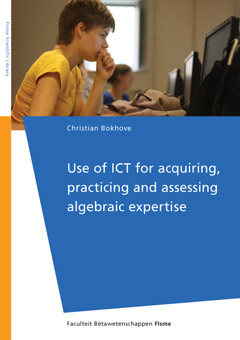 | Use of ICT for acquiring, practising and assessing algebraic expertise FI Scientific Library, nr. 68. Bokhove, Chr. (2011) 157 pp. |
 | https://www.fisme.science.uu.nl/publicaties/literatuur/2011_bokhove_0-158.pdf Abstract For several years the skill level of students leaving secondary education in the Netherlands has been discussed. Lecturers in higher education ?for example? complain about their freshmen?s apparent lack of algebraic skills. Another development in recent years is the advent of the use of technology in mathematics education. Combining algebraic expertise and ICT use, the aim of this study is to design an online environment for learning supported by formative assessment of both procedural skills and conceptual understanding in algebra, to investigate the effects of the environment, and to identify decisive factors that influence the outcome. The central research question, therefore, is: in what way can the use of ICT support acquiring, practicing and assessing algebraic expertise? This general question leads to several sub-questions, each related to an appropriate cycle in the study. The theoretical framework is based on the three key perspectives n ICT tool use, algebraic expertise, assessment and feedback. As we aim to design an intervention in several iterations, the research method is based on the principles of design research. Research takes place in one preparatory cycle and three subsequent cycles.The preliminary cycle concerns the design of criteria for an evaluation instrument for digital algebra tools. The instrument was used to choose an appropriate algebra tool for the remainder of the study, and design prototypical digital activities. In the first research cycle one-to-one think-aloud sessions were conducted with five 12th grade students. The results were used to examine the interplay between ICT and the acquisition of algebra, and determine what feedback could be added to the intervention. Based on the initial characteristics, the digital activities and feedback, the intervention was redesigned in an iterative fashion. The revised intervention was field tested in a second cycle for two classes (12th grade, wiskunde B, N=31), after which we made the final improvements based on three design principles al |